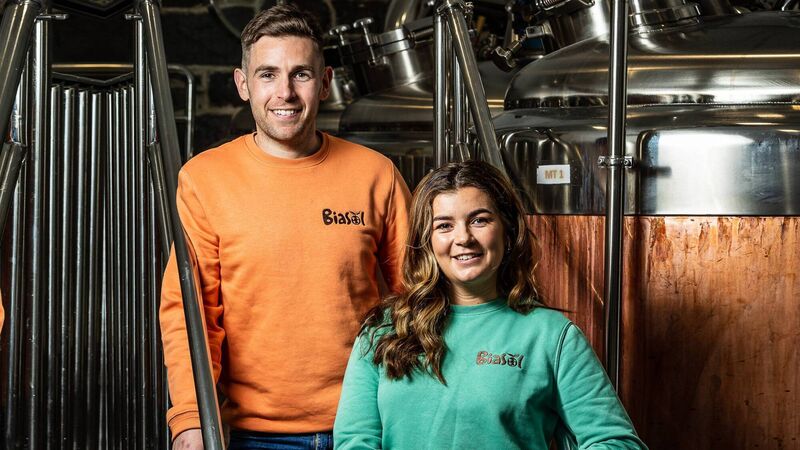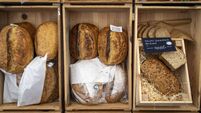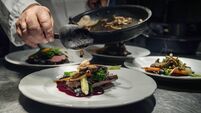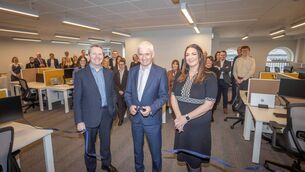‘Once you have perfected your product it’s vital to standardise your recipes’

Niamh and Ruairi Dooley, the brother and sister duo who have set up BiaSol, making a food supplement from spent grain lefrt over from making beer. Photo: Philip Doyle
Many people dream of starting a food business but what’s the recipe for success? Often the most important ingredient is the farmers’ market. It worked for Gavin McCarthy and Sara Mitchell’s rotisserie business Poulet Bonne Femme, and for cheesemongers Kevin and Seamus Sheridan.
Thanks Plants, one of the country’s best-known plant-based brands, sells today in supermarkets nationwide. Founder Aisling Cullen started at Dublin’s Green Door Market, in Bluebell, in 2019.
The work is hard and, if it’s outdoors, the weather can be too, but the barriers to entry are low. Stalls are cheap, at between €50 and €150 a day, depending on size and location. After that all you need is a table and gazebo, plus a generator if you plan to sell hot food. You must also register your food business with the HSE and have public, product and employer’s liability insurance.
For some food businesses, markets are a business model in themselves. But for start-ups with ambitions to develop a brand the big advantage they offer is direct access to customer feedback.
If your performance at a market is encouraging, the Local Enterprise Office (LEO) is your next port of call. Its Digital School of Food is a great place to tease the idea out further; this is a free to use learning hub designed to support food manufacturing businesses from start-up to the growth phase.
If that whets your appetite, the next step is to sign up for Food Starter, a follow-on series that takes place regionally over four half days. The objective is to provide the participants with a basic knowledge of what is involved in setting up a food business, as well as common pitfalls and how to avoid them.
LEO’s flagship food and drinks programme is its Food Academy, a collaboration with SuperValu and Bord Bia. This provides small food business with a solid foundation to progress to the shelves of retailers. All participants get an opportunity to pitch their product to a panel of SuperValu representatives. The panel mentors the businesses and shares their expertise and advice, assisting participants to make any changes necessary to improve their food offering in a competitive marketplace.
Food Academy is aimed at those businesses in the early to mid-stages of developing a food or drink business who have typically already developed a product, trialled it in the marketplace and are looking to scale up and grow. It consists of 10 half-day workshops covering six modules. Prior to the programme, there is a short online webinar which covers LEO financial supports for participating businesses. Each participant will also receive three dedicated one-to-one mentor sessions with an experienced food and drinks consultant. On successful completion of the programme, SuperValu provides participants with the opportunity to stock their product in the local stores for a trial period of 10 weeks.
There were more than 100 applications to the 2024 Programme with 27 businesses successfully completing the programme. Work has now commenced in accrediting the programme and Technological University (TU) Dublin will provide a certificate in food entrepreneurship for participants. This new partnership provides additional technical support in areas such as access to facilities, food testing and hazard analysis and critical control point (HACCP) food safety management system.
LEOs provide ongoing supports to the small business sector, including food-based businesses. That includes a range of financial and other supports, such as mentoring, throughout the business lifecycle, from pre-start-up to maturity.
Specific financial supports include feasibility grants for early-stage research on a proposal, business priming grants for start-up businesses, business expansion grants and market discovery grants to fund attendance at overseas and international trade shows.
Access is also provided to businesses seeking loans through Microfinance Ireland. These are worth up to a maximum of €50,000.
This year the network of LEOs has partnered with Blas na hÉireann to sponsor the coveted best artisan award, as well as collectively supporting the best in county awards for each of the Republic of Ireland counties in which the LEOs operate.
Blas na hÉireann itself provides food and drinks businesses supports, including through its Backyard at Blas initiative, a series of development workshops that take place in various regional locations and offer producers an opportunity to meet peers, network with industry figures such as buyers, and learn from experts.
It also offers mentorship from industry experts such as Vivienne Gleeson, a food business consultant with deep experience in the sector.
“I’m delighted to be part of the Blas Backyard mentoring panel, which offers support across branding, new product development, public relations, and social media management,” says Gleeson.
“This programme was created and is championed by the Blas na hÉireann team with Taste4Success Skillnet Ireland. Last year, The Backyard at Blas mentoring programme won the award for best coaching or mentoring initiative at the Learning and Development Institute Excellence in Learning Awards.” As part of reaching the finalist stage at Blas, businesses are offered free mentoring, an added benefit of entering the awards.
“I provide PR mentoring through three one-to-one sessions after the awards. In the run-up to the awards in Dingle, finalists can also access bite-sized, 30-minute online sessions,” she explains.
“In my mentoring through this programme, I help finalists understand how PR works, how to spot opportunities, and how to build a simple, cost-effective strategy that they can put into action straight away. The sessions are tailored to suit their business, helping them cut through the jargon and demystify the process so it feels manageable and practical. That way, they can plan with confidence, and if they choose to work with a PR consultant or agency, they’ll know exactly how to brief them and get the best value for money.”
Among the many food producers Vivienne has mentored through this programme is Mullingar’s Sugar Plum Sweetery, just as it prepared to launch into Avoca stores. “Our sessions focused on maximising PR opportunities around the launch, preparing a press release, as well as planning for the year ahead - and what a year they had,” she says.
Celebrity chef and bestselling cookbook author Brian McDermott is also on the Blas mentor panel. He does an enormous amount of work with food start-ups in his consultancy practice, including in relation to new product development.
He started out in the Kerry Group, an Irish food industry giant, in a role that saw him work across both retail and food service.
He also provided the inspiration for, and acted as a consultant for, Foodovation, a dedicated support centre for food start-ups, which is located in Derry.
Having, to date, worked with more than 150 food businesses he knows exactly what it takes to start strong and advises aspiring food entrepreneurs to first ask why they want to do this, exploring what their drivers are, as well as their product’s likely unique selling proposition.
“It’s just not good enough anymore to say we’re local, we’re artisan. The words are a little bit tired now and offer no guarantee of success in the marketplace,” he explains.
He advises all start-ups to walk the aisles in their local supermarkets to get a sense both of what the competition is like, and what retailers might want. It can’t simply be yet another jam, he says, even if it’s “their granny’s and the best in the world”.
“It’s about how are you going to make sure your product is different, stands out and will sustain itself in the marketplace,” he explains. That includes getting your pricing right.
Pricing mistakes are common starting out, particularly when the founder forgets to factor in their own time.
Understanding your compliance and regulatory obligations are vital too. Decisions must also be made as to whether a product is designed for retail, food service or both.
When it comes to developing new products, Innovation Vouchers from Enterprise Ireland can help, these offer up to €10,000 worth of time with an expert, third-level researcher to help you develop an idea or product, or to crack a business or technical challenge.
Once you have perfected your product, it is vital to standardise your recipes, cautions McDermott. It is the only way both to ensure that the consumer always knows what it is getting, and that you can scale up production.
Whether or not to manufacture yourself, or outsource to third parties, is another important decision to make, as are distribution channels. Selling something direct online gives you more margin. Selling through retail gives you more volume and visibility.
Many food businesses start off at the kitchen table, before moving to a rented space, such as a community kitchen. Special units, such as Spade Enterprise Centre in Dublin, provide low cost and flexible rents, which can help accelerate your progress.
Tullamore food business BiaSol, which takes spent grains from breweries and upscales them into tasty, nutritious snacks, has won a slew of Blas na hÉireann awards, including gold.
The business was set up by Niamh Dooley and her brother Ruairi, initially as a Covid project. They too started out by selling at a local farmers’ market.
Today their plant-based business employs 13 people and has a wide range that includes everything from healthy snacks and granola to scone mixes. All are available both online and in supermarkets nationwide.
“For us, or for anybody starting out, the key is to make your product, in whatever shape or form it is, and to bring it to your local farmers’ market,” says Niamh Dooley.
“Just get out there in front of people. Back then we had our products in brown bags glued shut with a label stuck on, but it doesn’t matter, it’s all about getting out there, getting people tasting it, and getting the kind of feedback that, if you were to pay a research company to gather for you, would cost you thousands of euro to get. So get as much feedback as you can and tweak your recipes accordingly.”







